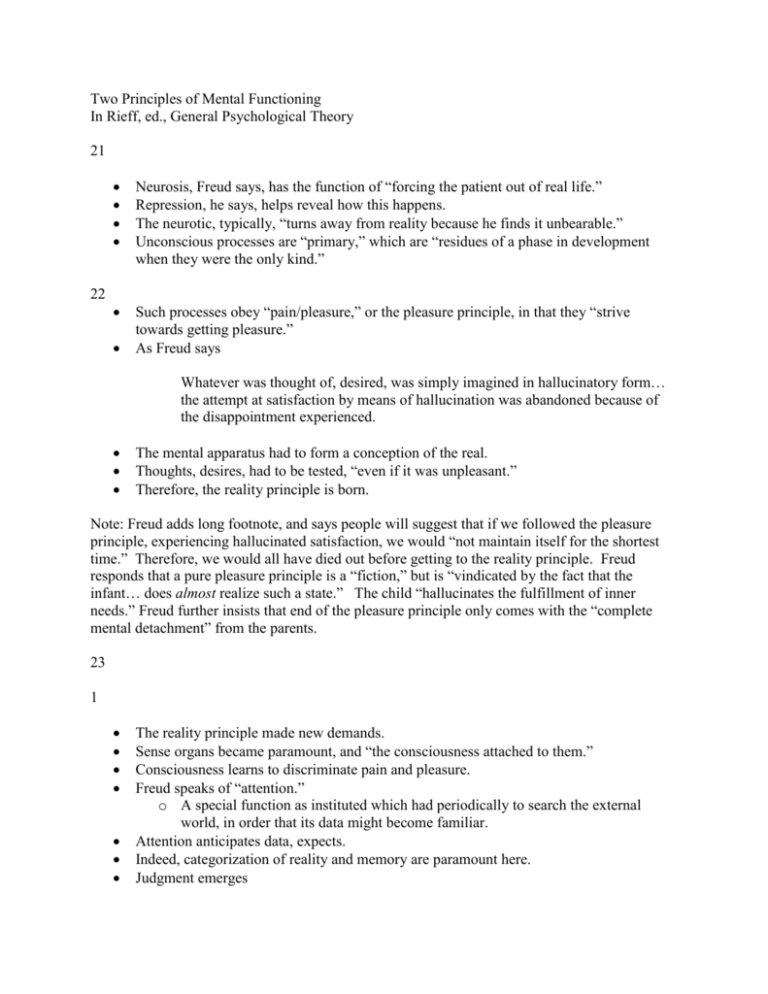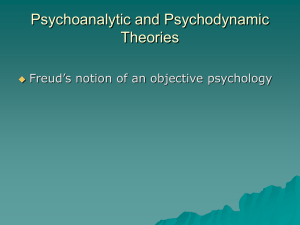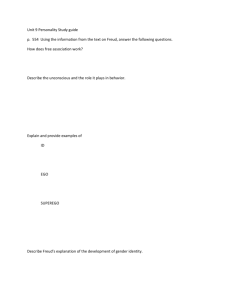
Two Principles of Mental Functioning
In Rieff, ed., General Psychological Theory
21
Neurosis, Freud says, has the function of “forcing the patient out of real life.”
Repression, he says, helps reveal how this happens.
The neurotic, typically, “turns away from reality because he finds it unbearable.”
Unconscious processes are “primary,” which are “residues of a phase in development
when they were the only kind.”
Such processes obey “pain/pleasure,” or the pleasure principle, in that they “strive
towards getting pleasure.”
As Freud says
22
Whatever was thought of, desired, was simply imagined in hallucinatory form…
the attempt at satisfaction by means of hallucination was abandoned because of
the disappointment experienced.
The mental apparatus had to form a conception of the real.
Thoughts, desires, had to be tested, “even if it was unpleasant.”
Therefore, the reality principle is born.
Note: Freud adds long footnote, and says people will suggest that if we followed the pleasure
principle, experiencing hallucinated satisfaction, we would “not maintain itself for the shortest
time.” Therefore, we would all have died out before getting to the reality principle. Freud
responds that a pure pleasure principle is a “fiction,” but is “vindicated by the fact that the
infant… does almost realize such a state.” The child “hallucinates the fulfillment of inner
needs.” Freud further insists that end of the pleasure principle only comes with the “complete
mental detachment” from the parents.
23
1
The reality principle made new demands.
Sense organs became paramount, and “the consciousness attached to them.”
Consciousness learns to discriminate pain and pleasure.
Freud speaks of “attention.”
o A special function as instituted which had periodically to search the external
world, in order that its data might become familiar.
Attention anticipates data, expects.
Indeed, categorization of reality and memory are paramount here.
Judgment emerges
…there developed an impartial passing of judgment, which had to decide whether
an idea was true or false.
24
Freud speaks of thought, as it develops.
Thought was endowed with qualities which made it possible for the mental apparatus
to support increased tension during a delay in the process of discharge. It is
essentially an experimental way of acting, accompanied by displacements of smaller
quantities of cathexes together with less expenditure.
Indeed, for this to occur “free cathexes had to be bound.”
Freud says “it is probable thinking was originally unconscious,” and only later became
conscious.
Even with the reality principle, one type of thought was not affected, kept from reality
testing.
This is “phantasy making,” such as games, and later day dreaming.
2
25
3
The reality principle does not take charge “all at once.”
Freud says that “while this development is going on in the ego instincts, the sexual
instincts become detached in significant ways.”
o Auto erotic activities do not need the world for satisfaction.
o The latency period puts sex into abeyance
As Freud says
The perpetuated activity of autoerotism makes possible a long retention of the
easier momentary and phantastic satisfaction in regards the sexual object, in
place of any real satisfaction… In the realm of phantasy, repression remains all
powerful; it brings about the inhibition of ideas in statu nascendi before they can
be consciously noticed.
Indeed, he says that “this is the weak place of our mental organization.”
However, this implies that
The mental development of the sexual instincts is delayed and remains far longer
under the supremacy of the pleasure principle, and for many people it is never
able to withdraw itself at all.
Note: Actually, it seems Freud should hold here that the sexual instincts are always governed by
the pleasure principle, for everyone.
Freud, though, insists that there are good and bad ways of dealing with this.
Neurosis, he says “…lies in delayed training of the sexual instincts in the observance of
reality, and in the conditions that make the delay possible.”
Freud says just as the pleasure ego can only wish, the “reality ego” strives for what is
useful.
26
4
Note: Freud cites Bernard Shaw in saying “to be able to choose the line of greatest advantage
instead of yielding to the line of least resistance.”
The reality principle, though, “does not dethrone” the pleasure principle.
Rather, it really “only safeguards it.”
A momentary pleasure, uncertain in its results, is given up, but only in order to gain
in the new way an assured pleasure coming later.
Freud offers a comment on religious myths of the afterlife here.
Namely, when religions suggest “absolute renunciation of pleasure in this life by means
of compensation in a future life, they have not achieved overcoming of the pleasure
principle in this way.”
Freud says science and education come closest to following the reality principle.
Then again, there is “intellectual pleasure.”
And the love of tutors, peers, etc. are offered as greater pleasures.
Art reconciles the two principle- pleasure and reality.
As Freud says
5
6
o Art is originally turned to because man “cannot come to terms with the
renunciation of instinctual satisfaction.”
o Yet he molds his phantasies into “truths of a new kind.”
o Indeed, such art is a “reflection on reality” of a kind and he is insightful enough
to get it.
However, importantly
…he can only achieve this because other men feel the same dissatisfaction as he does
that is demanded by reality…and because the displacement of the pleasure principle
by the reality principle is part of reality.
27
8
Unconscious, repressed processes “disregard reality-testing.”
Namely, “thought reality is placed on an equal footing with external actuality, wishes
with their fulfillment.”
However, as analysts, one must
…never allow oneself to be misled into applying the standards of reality to repressed
psychical structures…into undervaluing the importance of phantasies in the
formation of symptoms…or into tracing a neurotic sense of guilt back to some other
source because there is no evidence that any actual crime has been committed.
Freud is saying we must remember the rules of neurosis.






